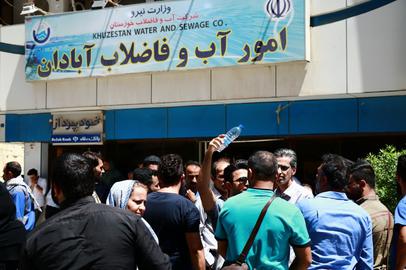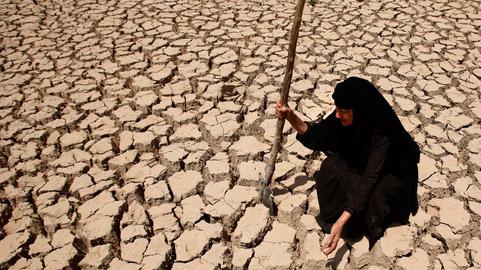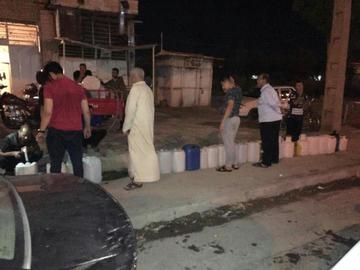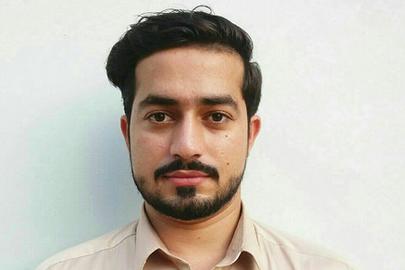The crisis of polluted drinking water in Mahshahr and Bandar Imam Khomeini has reached a climax: It is now threatening the health of all residents of the two cities in the southwestern province of Khuzestan.
Malfunctioning sewage systems, a shortage of purified water, and the need to chlorinate water because of bacteria and the risk of disease have now become an everyday phenomenon. The head of Mahshahr’s Health Center announced that pollution had been clearly visible in samples taken from drinking water in the area.
In summer 2017, the area suffered an outbreak of measles and various other kinds of infectious and digestive diseases, with many people seeking medical attention and hospital beds. Health officials were forced to embark on an immediate vaccination campaign.
People have become quite used to the brown color of the water flowing from their kitchen faucets, and to the bits of garbage that occasionally flows through as well. Local residents say their lives have become unbearable. The water — and the mud and sludge found in it — smells putrid. In some cases, residents have found excrement in their tap water.
No official source has confirmed or denied these reports.
Some residents believe the most likely reason for the recent crisis is that there has been a breach in the water and sewage systems. In 2017, Ali Nouri, the head of Mahshahr’s Health Center, said that certain areas of Bandar Imam Khomeini lack sewage systems and that drinking water is not purified or chlorinated.
Environmental expert Hamid Reza Karahi lives in Mahshahr and has supervised water and sewage system projects. “Mahshahr’s water problems will not go away [as a result of] short-term projects and promises without allocating the necessary large amounts of funds,” he told IranWire. “The extent of the disaster has forced people to embark on ad-hoc migration to other cities, near and far. People are escaping and there can be no doubt that dust storms, pollution caused by the petrochemical industry and the low quality and quantity of water are the major factors for this.”
Clean Water Unaffordable
Many people, like Taleghani district resident Maryam Niaei, cannot afford to buy the clean water brought in by tankers. “These days, business for tankers or places that sell purified water is booming,” she said, “but many local residents cannot afford to buy water from the market and have no option but live with the tap water.”
Environmental expert Karahi explained how the water is distributed in the region. “Drinking water in this area originates from the river Karun,” he said. “It then goes to Kut-e Amir and from there to Mansurieh and then to Gorgor until it reaches Bandar Imam Khomeini. Then it goes to the Salt Lake station for distribution to different areas. This is a distance of over 100 kilometers. The station has four water pumps to distribute the water. The problem is that at the present only one of them works and the three other pumps are out of action.”
Mahshahr’s governor has repeatedly promised people that the water problem will be solved soon, but Ebrahim Alvani, the head of the city’s Water and Sewage Center, told local media: “Because of funding problems, projects have been abandoned midway. To get the necessary funding, urgent action is required.”
And Karahi said Mahshahr’s water crisis goes beyond drinking water. “All the people who live in the area are desperate because of the shortage of water and the threat of cholera as a result of problems with the sewage system. They also have to deal with dust storms and the heat. Every household must buy its own pumps to draw water from the water mains that, because of low pressure, cannot deliver the water into homes. Many cannot afford it and even if they do, they can use it for only a few hours a day because of blackouts...the water is cut off throughout the night...And then the water pumped in is brown and stinks.”
According to Niaei, people who do buy their own pumps can’t use them as much as they need to because they consume too much electricity. “Even with a pump, the water pressure is very low. And without a pump, the water comes out in drops. Now imagine when the electricity goes out constantly during the day and people are left without water — because a blackout means no water.”
Khuzestan Water and Sewage Corp, the company under contract to maintain the water delivery system, manage Salt Lake station, and the sewage systems did not respond to IranWire’s repeated requests for comment.
Water for Industry, Not for Homes
Not only is pollution rife, says Hamid Reza Karahi, the water is not fairly distributed. “The water system infrastructure needs an overhaul. Salt Lake station has to do with a half-broken pump instead of the four it used to have, and a large share of the water goes to the petrochemical industry. This industry has no obligation to purify the water it discharges after use and so it releases polluted water. These two factors cause water to be cut off. But the more serious problem is pollution. Polluted gutters, filled with garbage, drain into water ponds that are then delivered into people’s homes.”
And yet residents believe there could be a solution, but authorities are simply refusing to act. “Why can the United Arab Emirates desalinate enough water from the Persian Gulf to satisfy the demand of a big city like Tehran and we do not have such a simple technology?” Maryam Niaei asks. “I have lived in Iranshahr for many years. My parents were born here. We all know that our share of drinking water goes to the petrochemical industry. Like an octopus, the petrochemical industry has taken over our drinking water and we are left with a glass of muddy water that sends us to the hospital. We are worried sick about the health of our children.”
Local residents say that besides water cut-offs, the malfunctioning sewer system has driven them to desperation. For years now the inadequate sewage system has caused infectious diseases among children. Gutters filled with sewage flow next to homes and residential areas and sometimes overflow into the alleyways, streets and even thoroughfares. Witnesses say this can be seen every hour of every day.
Mahshahr’s sewage flow into open canals and these canals have been the source of many tragedies and disasters — from children who have drowned in them to the spread of contagious diseases among the deprived people of this area.
Local officials have given a deadline of March 2019 for the city’s water problems to be solved, but they have made similar promises in the past. “We are not very optimistic,” says Maryam Niaei.
These days, when the people of Mahshahr get together, there is always talk of leaving for cities that can offer a decent glass of drinking water.
More on drought and environmental crisis in Iran:
An Iranian Patriot Vs. a Corrupt System, April 19, 2018
Drought in Sistan and Baluchistan, December 14, 2017
New Health Warnings for Lake Urmia, July 20, 2015
Disaster is Looming, June 15, 2015
New Fears For Public Health near Lake Urmia, May 28, 2015
“Iran Could end up like the Horn of Africa”, January 30, 2015
Crime: Defending the Environment, November 4, 2014
Iran's Provincial Water Wars, November 7, 2013
visit the accountability section
In this section of Iran Wire, you can contact the officials and launch your campaign for various problems



























comments